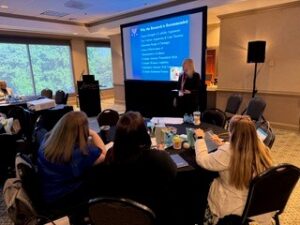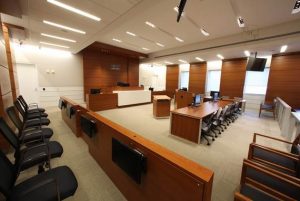Why do research
The practice of law is constantly changing and growing. Litigators must keep up with changes in the law, changes in their clients’ needs, and changes in fact finder (jury) impressions. The amount of information an attorney must process in handling a case is enormous. Ironically, while the litigator ultimately must be prepared to “do battle” in the courtroom, opportunities to hone trial skills are reduced by the often compulsory utilization of alternative dispute resolution procedures. Thus, many attorneys are becoming more experienced at influencing mediators and arbitrators than they are at persuading jurors. How can the trial attorney get the edge with jurors?
One way to keep trial skills sharp and to ensure everything possible is being done for the client, even under changing conditions, is to conduct jury research. Knowing what the jury wants to know helps you streamline the case and allows you to work “smarter”. Jury research helps the litigator integrate all case information available, perform effectively and efficiently, and lets the client know that the best possible result was achieved.
Call the experts at Magnus for information on maximizing results.
During the decades Magnus’ Director of Research has been working as a litigation/jury consultant, a common lament among attorneys is that, although they are convinced of the benefits of conducting pre mediation, pre arbitration, or pre trial jury research, their clients are not as enlightened as to be similarly convinced. Magnus regularly works on cases with adjusters who, despite considerable experience in handling large scale litigation, have never worked with a litigation consultant. In addition, we often work with numerous corporate representatives who, until working with Magnus, have never understood the behind the scenes details that emerge as a result of our work. Sometimes, the attorney handling the case is unprepared to answer all of his/her clients’ questions about the benefits of working with a jury, trial, or litigation research consultant. Other times, even when the attorney has considerable experience working with firms that conduct attitude surveys, mock trials, and focus groups, the end client is unable to understand why the expenses incurred are well worth the time and effort of the corporation or insurance company. Without a doubt, litigation is expensive. Attorneys are being asked to be accountable for each expenditure related to arbitration, mediation, and trial, such that, on the surface, social science research can appear as more of a luxury than a necessity. However, effective fact finder research is often one of the best investments that can be made in a case because the information gained from the research creates efficiencies of both time and effort on the part of the attorneys who are litigating the case. In addition, the enhancement of the attorney’s decisions, due to the knowledge derived from the research findings, is unsurpassed and cannot be achieved through any other means. Magnus has considerable experience providing attorneys and their clients with a cost/benefit analysis of our work within the overall context of the lawsuit. We are always willing to confer with the attorney’s clients to explain our integral role in the litigation process. Information derived from pre mediation, pre arbitration, and pre trial fact finder research, of the kind provided by Magnus, cannot be obtained via any other means; attempts to short circuit this process will have a direct, negative impact on the litigation process and its outcome.
Call Magnus for information on pre-arbitration, pre-mediation and pre-trial research.
In the decades since Magnus’ Director of Research, Dr. Melissa Pigott, has been conducting social psychological research studies to assist attorneys prepare for arbitration, mediation, and trial, there has been a decrease in the number of research projects (including mock trials, focus groups, and attitude surveys) conducted immediately prior to trial. The vanishing jury trial phenomenon is well known and our attorney clients confirm they do not try cases as often as they used to; instead most cases are resolved as a result of the outcome of mediation or arbitration. Thus, Magnus has had a corresponding increase in the number of research projects conducted to evaluate cases and to help prepare strategies for mediation and arbitration.
This change of pace for many of Magnus’ clients has resulted in fewer attorneys having extensive courtroom experience, which, in turn, has led to increased difficulty in evaluating cases. (Decreased courtroom experience also impacts attorneys’ clients when clients are adjusters who also see fewer jury trials than in the past.) Jury research undertaken prior to mediation/arbitration can fill this knowledge deficit by revealing the thoughts, motives, and other predispositions of people who are similar to the jury in the event the case does not settle prior to trial. A thorough analysis of risk, whether the attorney represents the plaintiff or defendant, is crucial for accurate case evaluation prior to mediation or arbitration. Knowing the upside and downside of a case can help parties make informed decisions about resolving cases, and provides knowledge of which ones to litigate through trial.
Don’t go into your upcoming mediation or arbitration without contacting Magnus to evaluate your risk. Contact Magnus for more information on our ability to help you “win” early in your case.
Many of Magnus Research Consultants’ clients are surprised by the ratings they receive from our research participants and mock jurors. Some of the feedback we obtain is highly critical of the attorney’s presentation style, communications ability, appearance, and overall demeanor. On several occasions, in fact, Magnus has been retained by insurance companies and other clients’ organizations to evaluate the impressions their trial counsel make on the people who are being asked to decide the case. We have learned that often, the jurors are less interested in the legal aspects of the case than extralegal factors, including whether they like or dislike the attorneys on either side.
It is a common practice in many organizations (including Magnus) to survey clients about their impressions of the service they received, as well as to obtain feedback about how improvements can be made in the products and services offered to future clients/customers. This practice, although widely used in a variety of industries, is not as common among attorneys and their law firms. For this reason, many attorneys are surprised to find out their self assessments are often incorrect. We sometimes find out that our attorney clients would rather not know how they are perceived than obtain negative feedback that is counter to their personal beliefs. This, of course, is a dangerous practice, for many reasons. One of the most extreme examples of some attorneys’ desire to remain in the dark about jury eligible citizens’ impressions of them is evident during voir dire, in which venire members express a wide range of negative opinions about a law firm that is representing one of the parties in the case. We believe it is far better to know these opinions, and attempt to rectify negative impressions before trial than remain unenlightened until prospective jurors blurt out hurtful comments in open court.
Magnus has a variety of research techniques designed to assess both prior clients’ and the general public’s impressions of attorneys and their law firms. These research methodologies include interviewing past clients to determine their level of satisfaction with the service they received, evaluations of advertising effectiveness, and assistance with marketing to desired target populations. When we have conducted research for attorneys to evaluate their overall image in the community, we have always learned valuable information that could not have been found out via other means. Some of Magnus’ clients tell us they conduct post verdict and post settlement interviews with their clients, and while this is certainly preferable to doing nothing, it is unlikely that clients will reveal information to their attorney that they will reveal to a “disinterested” professional interviewer. Magnus has considerable expertise in interviewing, such that we often obtain information that cannot be gathered by the attorney on his/her behalf.
Contact Magnus to find out more information about what your clients REALLY think about you and your law firm.
On numerous occasions, Magnus Research Consultants has been asked by attorneys to conduct mock jury research as a “reality check” for their clients. In these instances, plaintiffs’ attorneys have indicated that their clients have unrealistic expectations about receiving a multimillion dollar verdict when the attorneys believe a substantially lower verdict is a more likely result. In a similar vein, defense attorneys often indicate that the corporations and insurance companies they represent undervalue cases that the attorneys believe have the potential for a runaway verdict. When we have conducted jury research on cases in which attorneys and their clients have disparate views, the mock jury verdicts provide convincing proof in support of one point of view. Consider conducting jury research to obtain a realistic picture of the value of the case, so that both you and your client can make an informed decision as to its overall value.
Contact the experts at Magnus regarding the reality check nature of jury research.
An under utilized benefit of conducting mock jury research is in testing the impact and effectiveness of demonstrative exhibits. All too often, we have observed attorneys spending valuable resources on demonstrative exhibits that are perceived by the jurors as having little, or even a negative, impact on the case. Evaluating trial exhibits in the context of mock jury research provides valuable insight that cannot be obtained through other means. In addition, when the attorney retains a full service jury services company, that is, a company that provides both jury research services and demonstrative exhibits (as does Magnus Research/Magnus Graphics), the attorney gains the added advantage of working with someone to develop trial exhibits that have emerged from jury research results.
Contact the jury research and demonstrative exhibits professionals at Magnus for more information on developing exhibits with maximum impact.
Magnus provides Insights for SuccessTM.
The benefits of conducting pretrial or premeditation jury research are numerous. One under appreciated benefit of jury research is in testing the jury instructions and verdict form that will be used at trial. On countless occasions, the results of Magnus’ jury research have revealed serious problems with jurors’ understanding of the proposed questions on the verdict form. In that attorneys usually have the ability to craft the wording of verdict form questions, testing alternate versions with mock jurors is a useful tool to ensure jurors’ comprehension of the questions. The order of the questions, although not as subject to modification as the wording, is also something that can be tested for maximum impact with jury research. Similarly, special jury instructions, particularly those which must be customized for a particular case, can also be drafted in a way to maximize jurors’ comprehension.
Contact Magnus to test jurors’ comprehension of jury instructions and verdict forms for your upcoming cases.
Many attorneys routinely use jury research to test mediation, arbitration, and trial strategies; it is less common to conduct jury research for the purpose of evaluating demonstrative evidence. Contrary to what some attorneys believe, today’s jurors have high expectations about animations, electronic presentations, and static exhibits, including document enlargements, diagrams, etc. Most jurors critique what they see in the courtroom based on expectations they have derived from law related television programs. As such, they believe attorneys should be facile in utilizing all varieties of sophisticated graphic evidence. Magnus Research Consultants and Magnus Graphics work together in assisting attorneys prepare graphics that will have the most jury appeal.
Contact Magnus to schedule an evaluation of your graphics.



